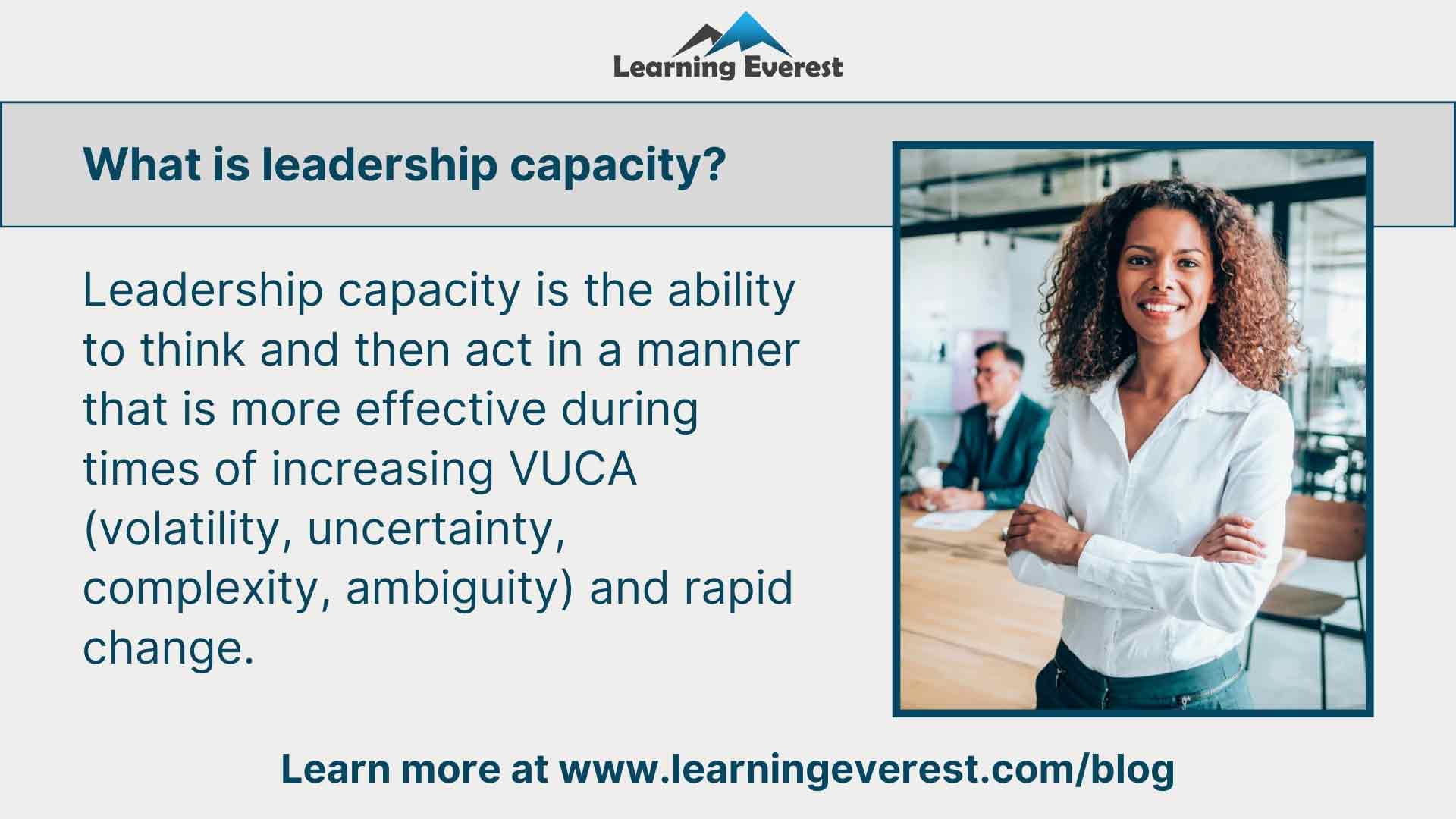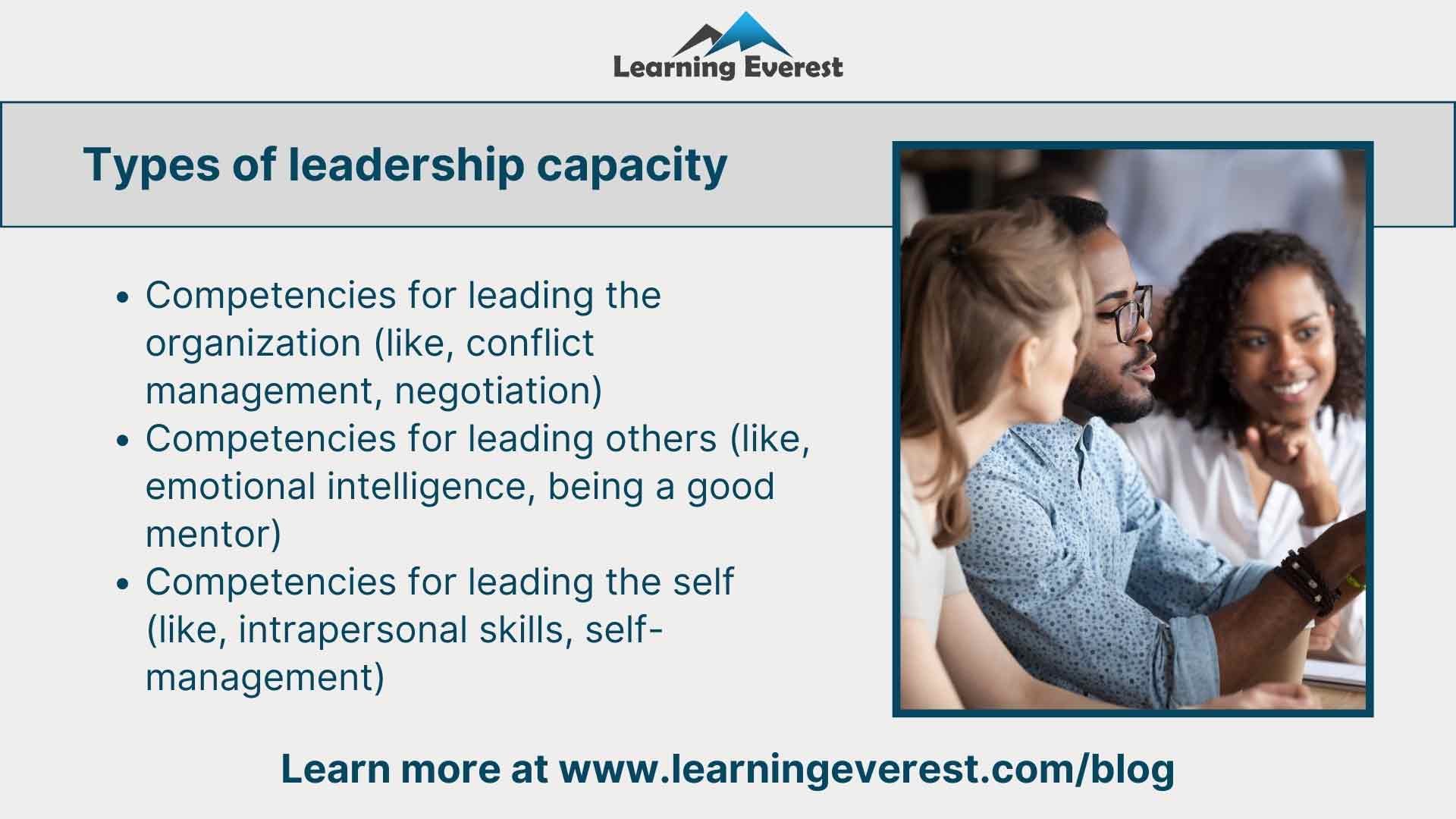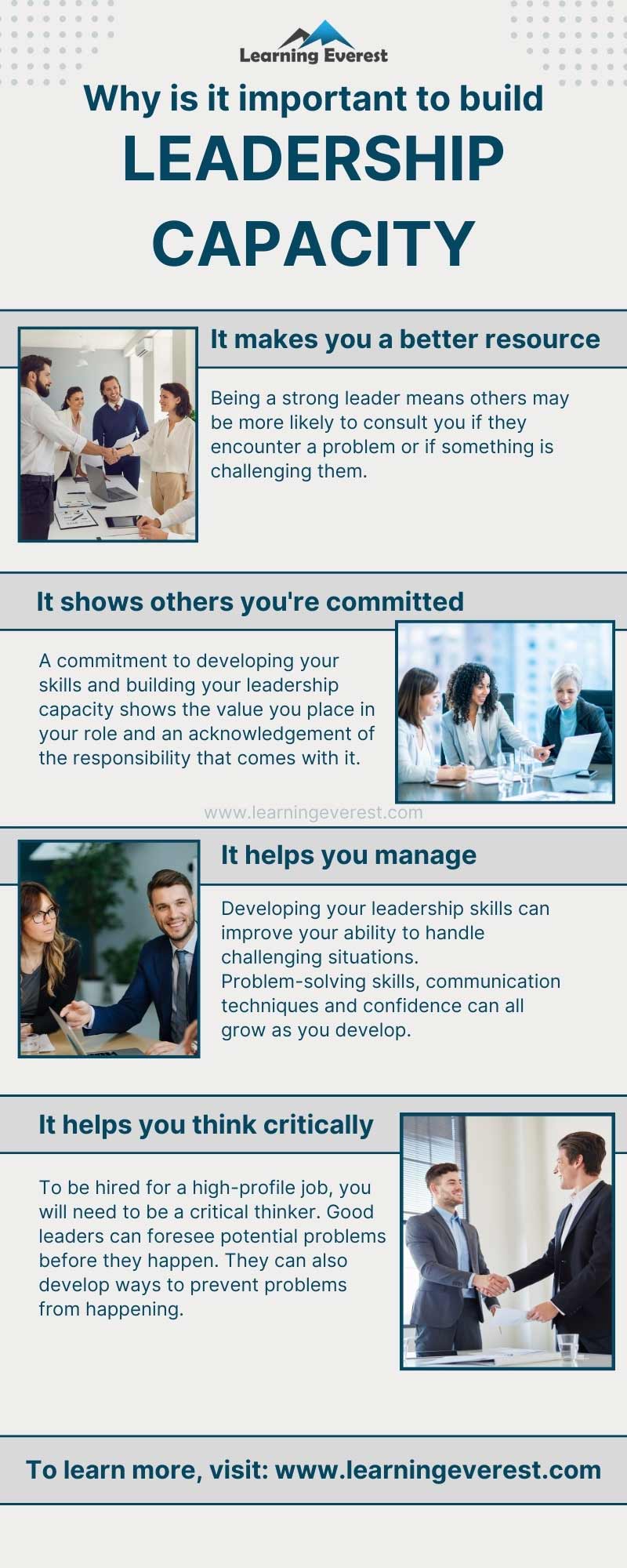Table of Contents
What is leadership capacity?
Leadership capacity is the ability to think and then act in a manner that is more effective during times of increasing VUCA (volatility, uncertainty, complexity, ambiguity) and rapid change. It is your capacity to change the way in which you lead to create more effective ways to get results. To be a good leader, you should have a solid understanding of both the work that you are doing and the people of your team as a whole. To be a great leader, you need to add adaptability. That is where building leadership capacity comes in.

What is leadership capacity?
The difference between leadership capacity & capability
Leadership capacity and capability are related terms, but they represent distinct meanings.
| Leadership capacity | Leadership capability |
|---|---|
| Leadership capacity looks at a leader’s aptitude to effectively take on the challenges and demands of their position.
Taking into consideration their time management skills, the power to arrange tasks according to importance and assign duties, and the capacity to handle stress and unpredictability. A leader with the capacity to handle the pressures of the role while continually demonstrating effectiveness and strength is essential for success. |
A person’s leadership capability reflects their skills, knowledge, and attributes, which enable them to effectively lead others.
This includes being able to communicate effectively, having a strategic mindset, being able to make effective decisions, having a high level of emotional intelligence, a critical thinking mind, and the capability of inspiring and motivating others. Someone with strong leadership capability skills can instill in their team confidence, teamwork, and a vision and guide their organization along the path of success. |
The core competencies of leadership capacity
Although leadership capacities vary between different roles, there are some core leadership capacities that are essential for every leader, regardless of the industry and organization they are in. There are three competency categories, such as:
- Competencies for leading the organization (like, conflict management, negotiation, decision-making, change management)
- Competencies for leading others (like, emotional intelligence, being a good mentor, diversity and inclusiveness)
- Competencies for leading the self (like, intrapersonal skills, self-management, courage, learning agility)
Other categorizations are possible too.

Types of Leadership Capacity
Examples of leadership capacities
Take a detailed look at some popular leadership qualities companies may value and look for in a candidate.
- Communication
- Negotiation
- Conflict resolution
- Adaptability
- Critical thinking
- Decision-making
- Problem-solving
- Relationship building
- Time management
- Reliability and trust
- Creativity
- Strategic approach
How to build leadership capacity?
If you are interested in developing your leadership skills and capacity, here are some steps you can take:
1 – Determine your core values
An important step in building your leadership capacity is developing your ability to lead with purpose. Genuine purpose often stems from your core values, so spend some time thinking about what matters most to you. Holding true to your integrity and core values can make you a more resilient, consistent, and reliable leader that others look to for support.
2 – Define your goals
With your core values in mind, think about your goals for yourself and for those you lead. If you already have a vague plan to improve weaknesses, you might succeed—or you might not. Like with most journeys, self-improvement is easiest when you have a solid plan. Ironically, the best way to achieve that is a sense of imagination. If you are trying to develop your leadership skills to excel in a specific role, consider how your own goals align with those of your employer. Being able to articulate and share your goals with others can make it easier for them to understand your expectations for them and to support you in accomplishing those goals.
3 – Develop your communication skills
To be an effective leader, it is important to be an excellent communicator. This means relaying information clearly, but it also means listening closely. Learn to hear those you lead and to let them know you value their input. Similarly, challenge yourself to have tough conversations rather than ignoring developing issues. For example, if you are managing an employee who isn’t performing, speak with them about it directly. You can be kind while remaining firm in your expectations. Doing this shows others you care about the overall performance of the team and want to elevate everyone equally.
4 – Be open to feedback
Every leader has weaknesses. Maybe you are great at developing ambitious ideas, but not great at fulfilling in the details. To build leadership capacity, you should know what your weaknesses are. Just taking enough time to reflect and write down potential weaknesses can go a long way. But it could also help to have honest conversations with people around you trust. Consider asking those you lead for feedback about your leadership style. They might have valuable advice for areas you could improve. Feedback is incredibly important for building your leadership capacity because it can show you ways to develop that benefit you and your team directly.
5 – Create welcoming spaces
An important aspect of asking for and receiving feedback is creating spaces where others feel comfortable relaying information that’s hard to hear. Try to establish healthy boundaries and communication expectations that make it possible for people to share what they need to without fear of repercussions. This means responding maturely when you hear something that upsets you and working with your team members to solve problems when they arise.
6 – Seek professional development opportunities
Even the best leaders can benefit from learning and developing. Always seek new information and resources about being an effective leader. Books, podcasts, continuing education opportunities, and seminars can all be significant sources of information. By constantly engaging with materials focused on building leadership capacity, you can commit to continually growing and improving in your role.
7 – Be kind to yourself
Developing leadership capacity is not something that happens overnight, a week, or even a year. It is a continuous process that evolves across your entire professional journey. If you can’t change your leadership capacities overnight, that is okay. As long as you are practicing self-awareness and putting in the work, you will get where you need to be.
8 – Coaching and mentoring
To succeed as a leader, it is essential to commit to continued learning and development plans for personal growth and professional development. Becoming an effective leader includes gaining leadership skills and fine-tuning key workplace skills. You can achieve these goals by receiving coaching or mentoring, gaining proper experience, taking leadership courses, and enrolling in leadership certificate programs. Leadership experience can come in many ways. From working in a team to participating in social groups or volunteering, you can gain experience in leadership in almost every aspect of life.
While these leadership experiences may not directly relate to your career, the knowledge gained from them can last a lifetime. To gain leadership skills formally, you can enroll in training and development courses. This is a greatly effective way to develop new capabilities, enhance existing ones, and establish the foundation for a successful career in leadership. In addition to courses and training, you can also pursue leadership certifications.
Want to add anything? Comment us below.
Infographic
Knowledge check!
Frequently Asked Questions (FAQs)
Q: What is leadership capability?
A: Leadership capacity is the ability to think and then act in a manner that is more effective during times of increasing VUCA (volatility, uncertainty, complexity, ambiguity) and rapid change.
Q: What are the core leadership capacities?
A: Although leadership capacities vary between different roles, there are some core leadership capacities that are essential for every leader, regardless of the industry and organization they are in. There are three competency categories, such as:
- Competencies for leading the organization (like, conflict management, negotiation, decision-making, change management)
- Competencies for leading others (like, emotional intelligence, being a good mentor, diversity and inclusiveness)
- Competencies for leading the self (like, intrapersonal skills, self-management, courage, learning agility)
Q: How to develop leadership capacity?
A: To be an effective leader, it is important to be an excellent communicator. This means relaying information clearly, but it also means listening closely. Learn to hear those you lead and to let them know you value their input.






